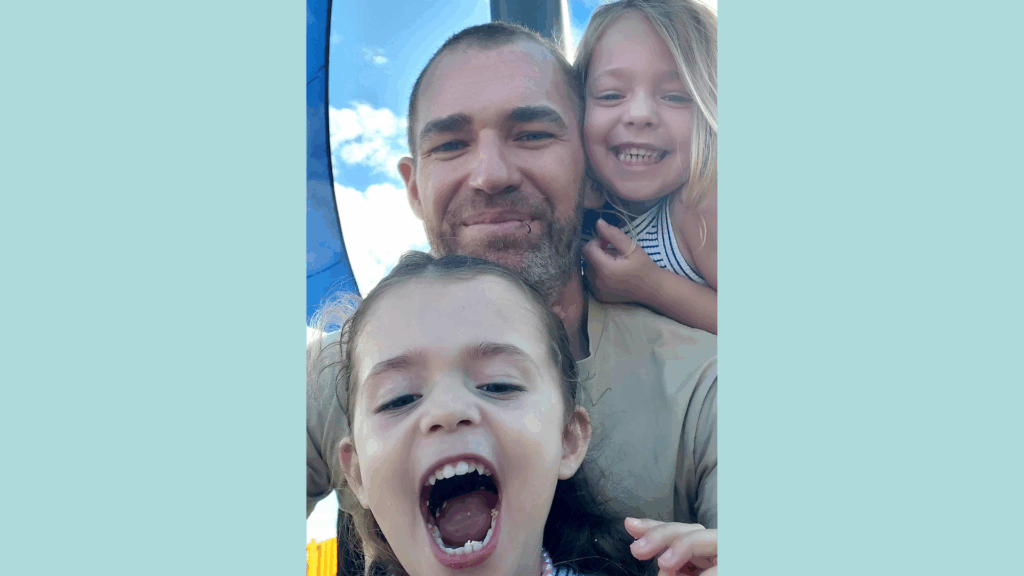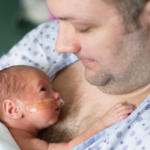The path to becoming parents was far from straightforward for Matt, 38, and his partner Racquel. And after years of fertility treatment, the pair welcomed their long-awaited twins earlier than expected at 32 weeks, four weeks after Racquel went into labour. The skipper shares his experience of bonding with his premmie daughters — who are now four years old and the polar opposites of each other — and his advice for other dads who are where he’s been.
I wouldn’t say fatherhood was something I was actively working towards until my wife brought it up. That’s who I am in life in general. She’s more planned and I’m more fumbling my way through a bit unsure on things. My partner had a few troubles with fertility, so it took a while. It was a lot of hormone therapy. And it’s a lot harder on the woman going through it than it is for the guy, because there’s the feeling of… what’s wrong with me and why isn’t this happening? I just tried to support her as much as possible.
Finding out we were pregnant after so long trying was very unexpected. The COVID lockdowns had just ended, things had opened up a bit. We planned this expensive holiday at the Sunshine Coast on the water and had this massive, fun weekend planned. She said, I’d better do a test just in case I’m pregnant. And she was. So, we cancelled the seafood dinners and celebrated the news a bit differently.
We knew there was a possibility of twins because of my partner’s fertility treatment but it was still a shock when the doctor told us.
My partner’s pregnancy was good until it wasn’t
Because it was twins, it was high risk. Then at 28 weeks, she went into labour. She was able to have medication to pause the labour and some medications to help the twins continue to grow. But once that switch is flicked you can’t stop it, it can only be delayed for an unspecified time. She was going to give birth preterm. It was just how preterm that was undecided.
Over the next few weeks, she was in and out of hospital. She spent a lot of time being monitored and checking the babies’ heartbeats. There were times where they completely lost one of their heartbeats on the doppler and we didn’t know whether that the heart had stopped or they just lost the signal. It was very stressful because you didn’t know whether you’d just watched one of them pass away. If you lose the heart beat you have ten minutes to get the baby out. But fortunately, they were both ok.
“At 32 weeks, my partner was out one day and she texted me saying, ‘Oh, I don’t feel great, I’m going to go in to the hospital.’ I didn’t think of anything of it because she’d been in and out of hospital. But they found that one of her waters had broken and said, “Your husband needs to get here because you’re in labour.”
I raced up there, made it in record time. It was during COVID, so they only let expectant fathers in.
As soon as we got to the room things progressed too quickly. They weren’t sure she’d have time for an epidural. They told me I had to wait outside. We were also told that the twins might not be able to stay in the hospital, and I might have to go with them to Brisbane in a life flight helicopter. Then they just left me in a room by myself. It really wasn’t the experience you think you’re going to have when you’re about to have kids.
Luckily for us, things worked out, they were able to give her an epidural and they were able to get me back in the room. My partner’s got a heart condition, so her heart was at like 260 beats a minute. So they’re thinking she’s going to have a heart attack and they’ve got to work quickly. Then out came two little, tiny babies. One was 1.5 kilos and the other one was 1.2. Just a head with this tiny little body. But they screamed straight away, which tells you they can breathe. That was a relief.
It’s hard to bond in that moment. You feel very powerless
Once my partner had recovered from surgery, she wanted to go down and see them so I wheeled her down, but we just had to sit there looking at them inside their little humidicrib.
We’d spent the last month – on and off – in the maternity ward, watching families with their kids in the bassinet next to them. But we couldn’t touch ours. We couldn’t do anything with them except for the times they changed them or they were doing anything medical-wise.
The next few weeks were very hard – you feel a lot of pressure to be there but it’s not really set up for you to spend time in there. It’s a really medically focused space. You feel bad for not being there. But if you’re there, you’ve got nothing to do. You’d get to the exit and you’d feel like you should go back in. The guilt was hard.

Luckily, we live 10 minutes down the road, so we went back and forth. I didn’t know anything about preterm birth before it happened. It’s very emotionally taxing. And while you’re coming and going from hospital life continues on and it’s hard. Having to work, you’ve still got to do the grocery shop.
We had some lovely nurses and some not-so-lovely ones; they laid on quite a bit of guilt. “You know that good mother over there, she’s staying here and she’s breastfeeding,” which we weren’t doing either. Other times, we’d write on the whiteboard that we will be in to help change their nappies in the morning and you’d arrive and they’d already done it, and you couldn’t touch them again until the afternoon. That was really hard.
“The girls were so small and you had to hold them very carefully. They’ve got heart rate monitors on and tubes for feeding and you’ve got to get the angle of their head right or they can’t breathe. They just felt so fragile and we were so nervous that something was going to happen to them.”
I wish I’d known then that I could read to them – whether it was a book or magazine – or just sit there with my hand on them. It would have given me something to do, which is exactly what we felt like we didn’t have, and it would have benefited the girls too. That would be my advice to other dads in the same situation.
When my partner’s mum came to visit her for the first time, my partner could only sit there and cry. That’s not the experience that you think you’re going to have introducing your children to your family. Needing to go through three sets of security doors, washing your phone, your hands, all that stuff.
We didn’t tell a lot of people what was going on but when we did we invited some friends to meet the girls – that made it feel a bit more normal. It was some of the most fun we had, everyone was so happy and excited to see the girls and it felt like more of a celebration.
Something that still brings a smile to my face was the process of naming the girls
When they came early we had a shortlist of names but nothing decided on. One night it was quiet in special care and we wrote down our options on the whiteboard, changed them around and mulled over them. It was really nice to do that together and it felt like something that was in our control.
Right before we went home we had to stay in the hospital for 24 hours so they can watch you be a parent. That one really stung because they don’t do that with normal-term babies. You just feel very judged at times. We actually couldn’t take them home the day we wanted to because it was COVID and Baby Bunting had sold out of car seats. We weren’t expecting to have babies at 32 weeks so we had never gotten around to getting them.
It was very surreal to get them in the pram and wheel them down the hall to go home and it was on Mother’s Day, it was really nice.















